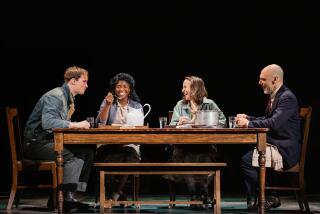BOOK REVIEW : ‘The Uncle From Rome’ Sings Dazzlingly : THE UNCLE FROM ROME, <i> by Joseph Caldwell</i> , Viking $20; 254 pages
- Share via
The amenable hero of this impressive novel is an American tenor in Naples on a dual assignment. In addition to having a subsidiary part in “Tosca,” he’s to direct his own translation of Benjamin Britten’s opera “Curlew River,” singing the important female role of “The Madwoman.”
Although he’s wholly at ease in “Tosca,” he’s tense about “Curlew River,” a rarely performed work never before presented to a sophisticated and demanding Italian audience.
When the imperious prima donna of “Tosca” asks him to accept still another role, he’s understandably reluctant.
As an American from Indiana, he’s never heard of the curious local tradition of having an “Uncle from Rome” appear at Neapolitan weddings to lend a worldly, authoritative aura to the proceedings. An actual uncle is always best, but when one doesn’t exist, Aganice Calefati, the Tosca, assures him that an impostor is often used. The mother of the groom, Calefati’s oldest friend, is a widow. In such cases, an uncle from Rome is absolutely essential to establish the status of the groom’s family.
Although Michael Ruane is skeptical of his ability to impersonate such a personage, Calefati promises him that it will be for only a few hours, that the responsibility is merely a matter of dressing well, speaking impeccable Italian and resuming his usual persona after having done her a great favor.
Despite his misgivings, Ruane lets himself be flattered and cajoled into agreeing. For a subsidiary tenor, the gratitude of a celebrated diva could be a crucial professional asset, while having her for an enemy could be disastrous.
As the wedding day approaches, Ruane finds himself looking forward to the event. He prides himself upon his acting ability and begins to think it might be fun to convince a cathedral full of Neapolitans that, for all his youth and Hoosier background, he is a person of consequence in the capital, with friends in the Vatican and influence in government circles.
Still mourning the lover who has recently died of AIDS, Ruane has been living ascetically, submerging himself in work and avoiding any emotional entanglements. He has almost accepted the fact that life will never offer him anything more than secondary roles and celibacy and that he’d better learn to make the best of it. Under the circumstances, isn’t he a natural uncle, fated to be the eternal outsider at family ceremonies?
When Ruane arrives at the cathedral, he is surprised that there are no attendants, no flowers and almost no celebrants. In place of a wedding march, the organ is playing the oratorio from Handel’s “Judas Maccabaeus.”
Disconcerted by the obvious irony, Ruane strides masterfully down the aisle to the strains of “See the Conquering Hero Comes,” then recognizes the mother of the groom by her fur coat and white flower.
“He embraced her, kissed her on both cheeks, then held her slightly away from himself, the better to drink in the sight of her, watering to full flower a kinship that had lain too long in the dust.”
For that instant, Ruane is an actor giving his all on stage, even though he feels like “a known madman given to assaulting important personages at sacred functions.” Assunta Spacagna responds warmly, and it seems as if the impersonation will go undetected. Ruane has become Don Michele Spacagna, Lo Zio da Roma , long-lost brother of her dead husband.
That is the last uncomplicated moment Ruane will enjoy. Within the hour, he becomes embroiled in intrigue, passion, tragedy, violence and mystery, a heady real-life brew rivaling anything in grand opera. Ruane cannot step out of character because he must remain in Naples to produce the Benjamin Britten work. Although he attempts to dodge the people he had met at the cathedral during his impersonation, that proves impossible.
Unable to escape the role of uncle, Ruane finds himself totally involved in the lives of the groom and the groom’s distraught brother, his purported nephews. Inexorably, he is drawn into the convoluted world of the Spacagna family, a world that overlaps and complicates his own professional one.
Actual events mirror operatic plots in a virtuoso demonstration of the author’s mastery of his own craft as well as those of librettist and composer. Exotic, vibrant and corrupt, Naples provides a spectacular setting for events that alternate among comedy, melodrama and genuine tragedy.
“The Uncle From Rome” is a dazzling tour de force, deftly melding the exaggerated passions of grand opera with the techniques of contemporary fiction, the novel kept buoyant by the humor inherent in the hero’s predicament.
Next: Carolyn See reviews “The Training Ground” by Siegfried Lenz (Henry Holt).
More to Read
Sign up for our Book Club newsletter
Get the latest news, events and more from the Los Angeles Times Book Club, and help us get L.A. reading and talking.
You may occasionally receive promotional content from the Los Angeles Times.










